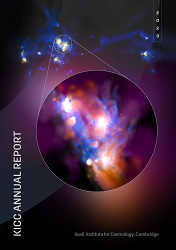
Submitted by Administrator on Mon, 04/05/2020 - 14:55
A new modified-gravity model, developed by Will Barker and coauthors, seems able to explain how fast the Universe is expanding
Einstein's theory of general relativity (GR) has survived for over one hundred years, but remains incomplete at high energies and is unable to formally describe the gravitation of fermions. Even at low energies, the cosmological concordance model, which is built around GR, has begun to show some cracks. In particular, determinations of the current expansion rate of the universe by direct observation of standard candles and inference from the CMB, are in tension.
In recent years, the Cavendish Astrophysics Group have performed a series of investigations into a natural, `fermion-friendly' generalisation of GR, known as Poincar\'e gauge theory (PGT). Systematic analysis of the ten-dimensional parameter space of PGT identified a number of stable theories with promising high energy behaviour. At low energies, these theories are expected to account for the same orbital precession predicted by GR.
Most recently, the background cosmology of the new theories was charted, identifying a particular theory which reproduces the cosmic concordance up to two major differences. Firstly, the actual open, flat or closed geometry of the universe is entirely arbitrary (the "k-screening" mechanism), and the expansion rate is driven towards that of GR in a flat universe. Secondly, the expansion rate may be perturbed from that of flat GR by an effective dark component. In the early universe, the dark component behaves like radiation before diluting away, and gives an optional boost to the early expansion rate. This in turn may be used to raise the CMB-inferred value of the Hubble number towards the locally-observed value.
Further tests are necessary to determine the healthiness of the PGT. In particular, the cosmological perturbation theory still poses a bottleneck to the usual Markov-Chain Monte-Carlo analysis of the cosmology, while the Group is engaged in ongoing efforts to address the ultraviolet completion of the theory.
This research was featured in Quanta magazine, which you can read here: https://www.quantamagazine.org/why-is-the-universe-expanding-so-fast-202...
Get the original paper here: https://arxiv.org/abs/2003.02690


